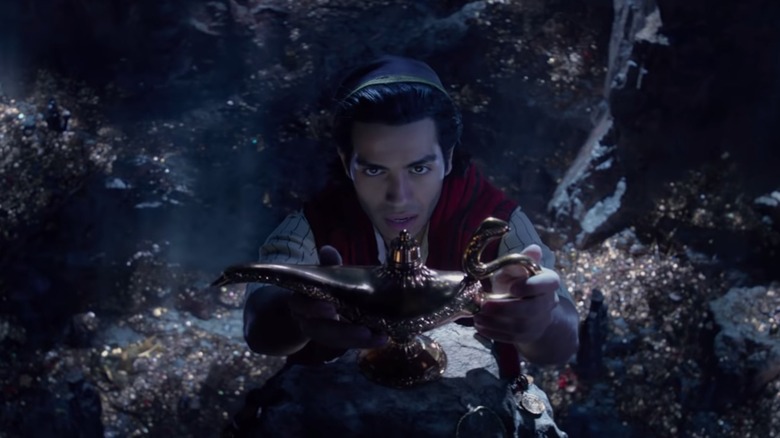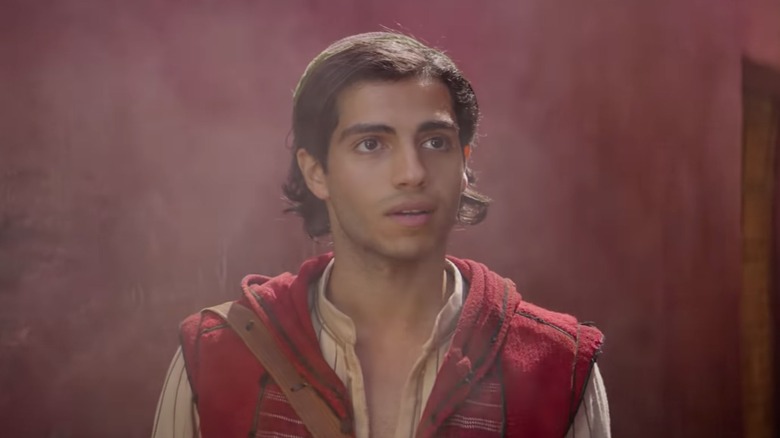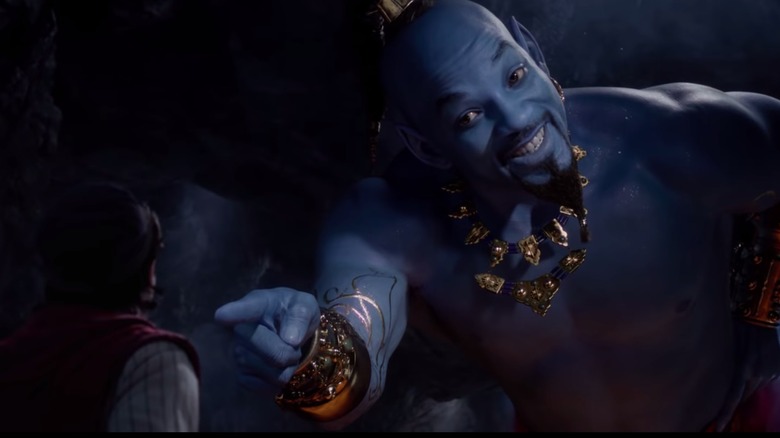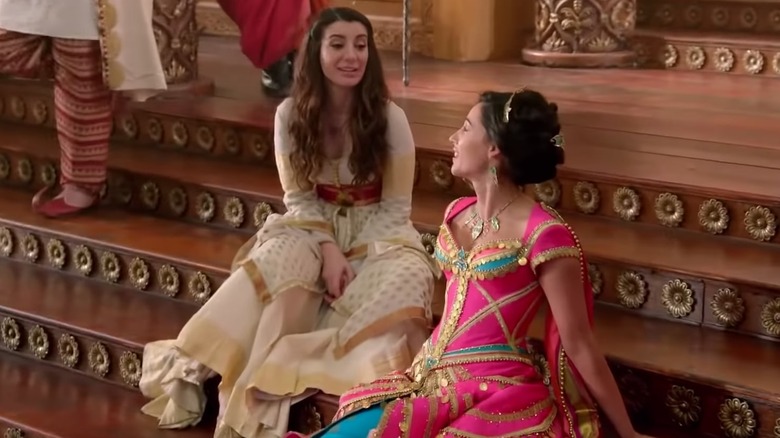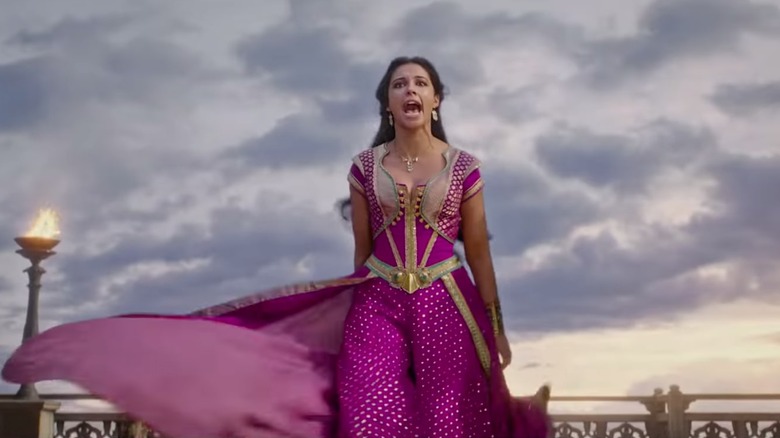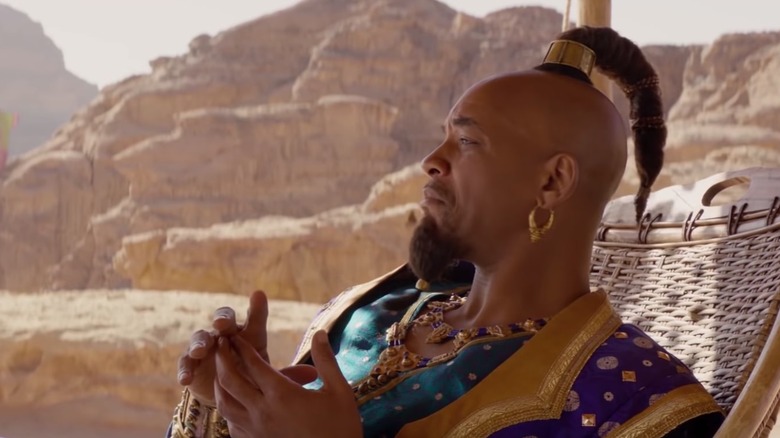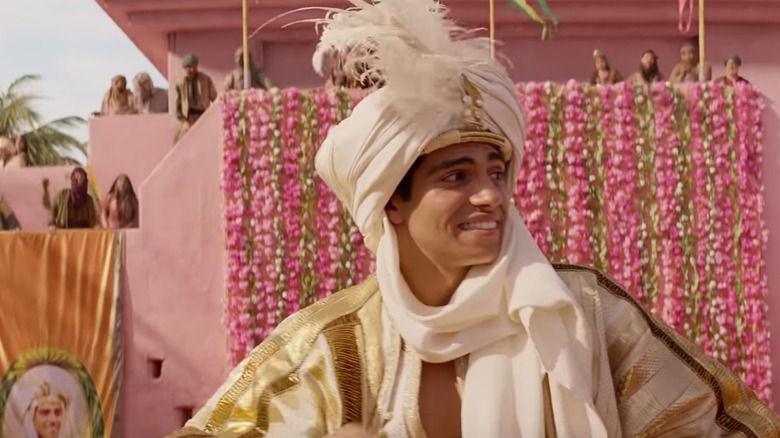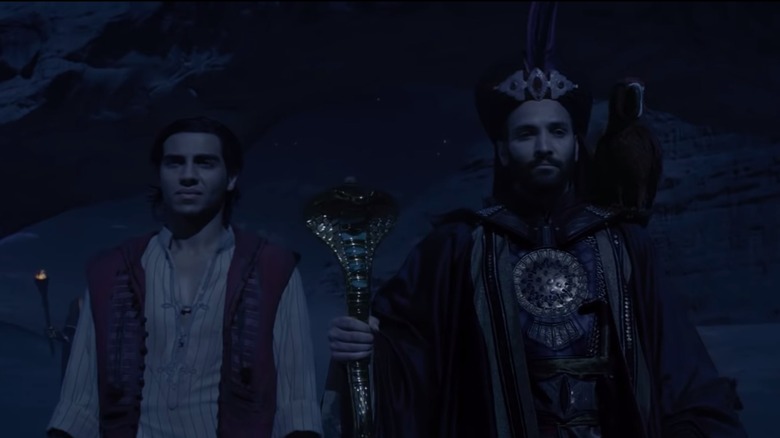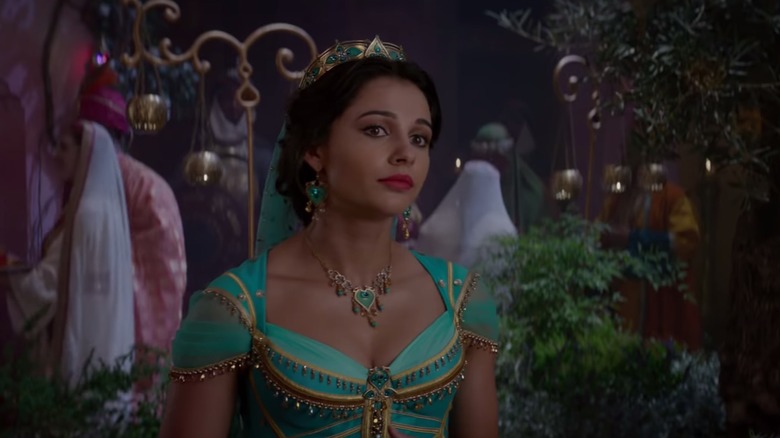Small Details In Aladdin You Missed
Released on May 24, 2019, Disney's much-anticipated, live-action version of Aladdin was met with a plethora of mixed reviews. Coming in at 60% on Rotten Tomatoes' all-powerful Tomatometer, movie critics seemed equally divided as to whether or not the live-action remake of the 1992 Disney classic was done well — or even needed in the first place.
Critic Matthew Rozsa rated the flick a 1.5 out of 4, writing for Salon, "Disney needs three wishes for its live-action Aladdin remake: for a better Genie, a better script and some soul." However, Charlotte O'Sullivan from the London Evening Standard thought the film was an enjoyable effort on the entire cast and crew's part, writing, "This Aladdin isn't better than the original. It is a fun spin-off, though, a jazzed-up film about the emptiness of wealth that will fill Disney's already heaving caves with even more gold."
Despite the mixed reviews, one thing's for sure: the 2019 remake of Aladdin is full of references to its original, animated counterpart — and also features quite a few noticeable creative departures. Here's everything you might have missed in Disney's Aladdin.
Where's the bread?
Much like in its original, animated counterpart, one of the very first sequences in Disney's live-action remake features Aladdin dashing through a bustling marketplace, being chased by angry street vendors. While he may evolve into a hero-prince by the end of the story, Aladdin is first introduced to us as a thieving, "riff-raff street rat." However, the titular protagonist's stolen goods in the 2019 remake differ greatly from the animated version's.
As fans of the original flick may remember, the scrappy, animated Aladdin begins his journey by stealing a simple loaf of bread. However, the live-action remake has our hero stealing not food from a street vendor, but jewelry from an unsuspecting civilian. It's not clear why exactly Guy Ritchie and John August made this decision — especially since the song Aladdin sings as he parkours through the market begins with the lyric, "One jump ahead of the breadline ..." — but perhaps it's because Aladdin's jewelry snatching ways become a central plot device of the movie when a stolen bracelet from Princess Jasmine gives him an excuse to see her again.
A Robin Williams tribute
As universally-beloved as Will Smith is, a Genie played by anyone other than the late Robin Williams was a tough pill for Aladdin fans to swallow. Even Smith was hesitant to take on the role, as he admitted in an interview with Ellen DeGeneres. According to director Guy Ritchie, Smith "didn't want to be insensitive to the memory of Robin [Williams], and what [he] had created."
If fans are able to get past the initial shock of seeing the Fresh Prince as the Genie, they'll be pleasantly surprised by the tribute paid to Robin Williams in Smith's rendition of "Friend Like Me." While the majority of the original musical number's lyrics remain the same, Smith brought his own fresh take to the song — replacing Williams' hilarious quirks and accents with his own hip-hop flavor.
Smith told Variety, "That first day messing around with 'Friend Like Me,' I noticed that it was in the BPM range of old-school hip-hop. So when I started playing with it, it was like, 'Oh man — this really lends itself to a tempo and a flavor that I really understand.'"
Jasmine and Dalia's BFF-ship
With Guy Ritchie's live-action Aladdin came a few brand new characters not seen in the original version. One of these characters was the goofy Prince Anders, a wannabe suitor for Princess Jasmine — but it was another new addition who completely stole each scene in which she was featured. Princess Jasmine's handmaiden, Dalia — played by Saturday Night Live alum, Nasim Pedrad — provided buckets of comedic relief, a love interest for Genie, and a much-needed friend for our princess.
As fans of the original likely remember, Princess Jasmine's best friend was Rajah — her super protective pet tiger. In fact, Rajah was pretty much Jasmine's only friend. While Rajah is still very much a part of the live-action remake, the lonely princess has found a new pal in Pedrad's Dalia — and these two are total BFF goals.
Naomi Scott, who plays Princess Jasmine in the remake, told The Hollywood Reporter, "I never realized it, but in the animation, Jasmine is really the only female character [...] So we wanted people to watch the movie and see Jasmine's relationship with another woman [...] That's something that's missing from the animation."
A feminist princess
Adding a second female character to the mix wasn't the only stride the 2019 live-action Aladdin remake made for women. The Guy Ritchie-directed film featured some seriously feminist themes throughout, and we are so here for it.
In the 1992 animated flick, the thing Princess Jasmine desired most in the world was the ability to marry for love, not politics or money. When we first meet the live-action Princess Jasmine, played spectacularly by Naomi Scott, love is the furthest thing from her mind. Instead, this princess wants the ability to be the Sultan — not marry a Sultan. And in a welcome surprise-twist at the end of the film, Jasmine finally gets her wish.
Also lacking from the original was a musical number for Princess Jasmine, aside from her duet with Aladdin. Thankfully, the 2019 live-action remake features an empowering solo song for the princess, entitled "Speechless." With lyrics like, "When they try to suffocate me/Don't you underestimate me/'Cause I know that I won't go speechless," this is bound to be a go-to feminist bop.
The genie is a ... human?
The opening scene of the live-action Aladdin remake features Will Smith talking to two kiddos onboard a ship in the middle of the ocean. However, this version of Smith isn't big, blue, or Genie-like at all. He's just a regular dude from a fictionalized version of Arabia. So, what gives?
Much like in the original, our titular hero uses his final wish to set Genie free. After all, our favorite member of the Blue Man Group has lived for thousands of years in a tiny, magical lamp — something which he verbally detests. In the animated movie, the Genie excitedly sets off on his first adventure as a free being in super '90s garb — but he's very much still obviously the Genie. However, in Guy Ritchie's live-action remake, Genie reverts to his human form when he's set free — and the opening scene is revealed to be a glimpse inside his new life with Dalia and their children.
Of course, as shown in the trailer, viewers are treated to Genie in his human form plenty of times throughout the movie. However, this doesn't take away from the moment Genie finally becomes a free man.
New lyrics
If you fancy yourself a big fan of the 1992, animated version of Aladdin (and can belt every word of its musical numbers), you likely picked up on a few key differences in the live-action version's lyrics.
Aside from the new song "Speechless," debuted by Naomi Scott's Princess Jasmine, the Guy Ritchie-directed flick featured some noticeable lyrical switch-ups — most of which served as fixes to the original film's rather problematic lyrics. As noted by Vanity Fair, the original version of the song "Prince Ali" features the line, "He's got slaves, he's got servants, and flunkies!" Oof. Thankfully, director Guy Ritchie and composer Alan Menken opted to remove the casual reference to slavery, changing the cringeworthy lyrics to simply, "He's got 10,000 servants and flunkies!"
Another problematic lyric featured in the original movie came with the song, "Arabian Nights," and describes Arab history and culture as barbaric. The song garnered much backlash after its 1992 release, causing Disney to tweak its lyrics for the at-home VHS — however, the word "barbaric" was still used. In the live-action version of the tune, however, "barbaric" is nowhere to be found.
Jafar has a whole new look
Even more controversial than Will Smith's Genie before Aladdin's May 2019 release was Marwan Kenzari's Jafar. While the Royal Vizier from the original, 1992 animated film was absolutely terrifying (especially for little kids), the newly-updated, live-action Jafar is, in a word, attractive. In fact, the villain's good looks left many an Aladdin fan confused about where exactly their loyalties lie.
In December 2018, BuzzFeed writer David Mack posted a shirtless picture of Kenzari next to a photo of the actor dressed as Jafar, tweeting, "I hope [Jafar] wins." Another Twitter user named Richard Newby expressed his appreciation of Kanzari's Jafar, writing, "Honestly, Jafar looks like a super nice dude who would throw lavish parties with the dopest mixtapes."
However, not everyone was impressed by Kenzari's portrayal of the villain. While the original Jafar's voice was unforgettably menacing, the new Jafar's vocal prowess doesn't quite live up to the hype — as many viewers have already noticed. Twitter user Kevin Brackett wrote, "I wasn't so sure about the casting of Marwan Kenzari as #Jafar at first. But honestly, the only thing he lacks is the voice to go along with his animated counterpart."
The mother of all questions
Disney movies have long been known for their problematic portrayal of mothers, or lack thereof. It's become a running, sadly-true joke that Disney likes to kill off the mothers of main characters, often before audiences even get to meet them — and this unfortunately proved to be true for both the animated and live-action versions of Princess Jasmine. However, Guy Ritchie's remake did provide some background concerning Jasmine's mother, unlike its animated counterpart. In the 2019 film, Jasmine briefly speaks about how she's rarely been allowed outside the palace walls since her mother was killed. While we never get an answer as to who exactly killed her mother, we do know that she didn't die from some mysterious, unexplained, plot-device of an illness.
While mother's presence may not be seen, it undeniably influences Jasmine's wishes to become a leader of her people. The princess even remarks that her mother would be disappointed to see how the fictional kingdom of Agrabah's people were being treated.
